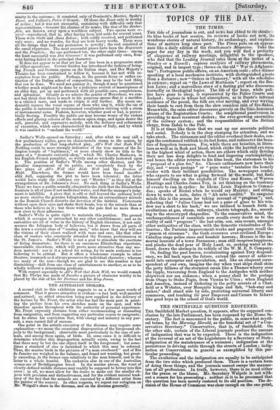TOPICS OF THE DAY.
THE TIMES.
THE tide of journalism is out, and news has ebbed to its shoals—
its blue books of last session, its reviews of books not new, its wondrous stories of natural history, its archmology, and explana- tions of matters long since past. The Times puts on an appear- ance like a daily edition of the Gentleman's Magazine. Take the paper for any day in the week, and you will find a prolixity of eloquence at railway meetings, delightful to the speakers, who find that the Leading Journal rates them at the inches of a Stanley or a Russell ; copious analyses of railway plisenomena, who find that the Leading Journal rates them at the inches of a Stanley or a Russell ; copious analyses of railway plisenomena, original, and in largest type ; theses on the old " War in Affghanis- tan " ; Portuguese public affairs, on an American scale ; after-dinner speaking at a local mechanics institute, with distinguished guests from a distance ; new" Orders in Chancery," with all the schedules
in extenso ; report on " the Laws of Mortmain " ; report on the Bre- hon Laws ; and a marvellous story of a fasting girl who discourses
learnedly on theological topics. The life of the hour, while poli- ties have gone to sleep, is represented by the Police Courts and Ireland ; regions in whose hot atmosphere, as in Dante's infernal residence of the proud, the folk are ever moving, and ever waving their hands to east from them the slow ceaseless rain of fire-flakes. Meanwhile, the calm editor discourses gravely on the time-honoured
abuses of the Registration Courts ; the sempiternal passiveness in providing to meet recurrent cholera ; the ever-growing enormities of the railway system ; and the responsibilities of the British clergy, from Indus to the Pole. It is at times like these that we -cast up our accounts political and social. Nobody is in the shop stamping for attention, and we take stock. The statesman and the editor overhaul their desks, con- sign the condemned rubbish to its last home, and rediscover the beau- ties of forgotten treasures. For, while there are beauties, in litera- ture as well as in flesh and blood, which strike the hurried eye even in the highest whirl of action, there are others which only develop their not less deep delights to fond and lingering contemplation; and hence the editor returns to his blue book, the statesman to his "proposal of a plan for," &c. Chronic enthusiasts now have their day, and "ocean postage" or "pure water" tantalize the homely reader with their brilliant possibilities. The newspaper reader, who expects to see what is going forward in the world, but finds himself dwelling on the exploits of Clive and Keane, of Warren Hastings and Charles James Fox, is set thinking on the tendency of events to run in cycles : he likens Louis Napoleon to Commo- dus ; speaks of Rienzi when he would say Mazzini ; and sitting down to write a note, dates it " Ab urbe conditti." To sanguine minds this is tile season for taking account of " progress" ; and, reflecting that "Julius Cmsar had not a pane of glass to his win- dow nor a shirt to his back," we are inclined to launch forth in exultations at gas, steam, railways, electric telegraph, &e., accord- ing to the stereotyped rhapsodies. To the conservative mind, the unchangeableness of essentials now recalls every doubt as to the reality of said "-progress" : the last crim. eon. case recurs, amongst other antiquities of the class, with the domestic vicissitudes of Be- lisaiius ; the Parisian improvement-works and pageants recall the " panem et circenses"; the Goth overawes over-civilized Europe ; Catullus sings police cases and boudoir horrors ; Horace is the im- mortal laureate of a town Parnassus; man still imagines happiness, and plucks the dead pear of Holy Land, or, seeking water at the fount, draws the shrimp in its vehicle of the W. M. E. S. Company. Or, finding the past barren, recakitrating against Tory despond- ency, we fall back upon the future, extend the career of achieve- ment into enterprise and speculation, and, like an eloquent corre- spondent of our own, imagine the day when vast ships shall skim the petty billows of the stormiest ocean like a Thames wherry over the ripple, traversing from England to the Antipodes with neither shipwreck nor sea sickness ; when a penny shall be the postage from Otago to Stoke Pogis, from Vienna to Utica; when England and America, instead of bickering in the petty accents of a Chat- field or a Webster, over Mosquito kings and fish, "bob-stay and sinker," shall stand side by side, protecting universal liberty and. commerce, and teaching its- poor Emperors and Ccesars to behave like good boys in the school of God's world.


























 Previous page
Previous page